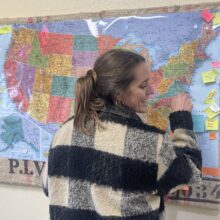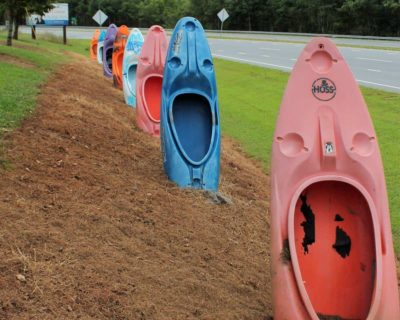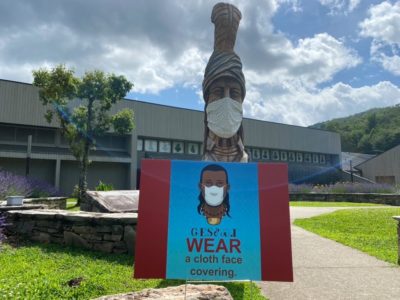Share this story
- “The outdoors now plays a role in the modern American landscape like never before." A recap on the Outdoor Economy Conference, and what role higher education institutions can play in this sector.
- What does the outdoor industry need from the higher education sector to make a greater economic impact? Those questions were posed at the 2022 Outdoor Economy Conference in Cherokee last week.
The pandemic led more people to the outdoors, and the opportunity to sustain those numbers on trails and in parks throughout North Carolina depends on the industry coming together to collaborate.
Last week, the Outdoor Economy Conference was held in Cherokee, North Carolina. This four-day gathering brought together stakeholders in the outdoor business sector, federal and state agencies, environmental leaders, entrepreneurs, and the higher education community to have conversations on the state of our outdoor economy, and to discuss what opportunities await in the years ahead.
According to the Bureau of Economic Analysis (BEA), the outdoor recreation economy accounted for over $374 billion of the country’s GDP in 2020. Around $9.9 billion of that was within North Carolina.
The BEA also calculated that there are a little over 123,000 total outdoor recreation jobs within the state. The pandemic no doubt will affect those numbers, and in November, we will see a new data set released for the year 2021.

Community colleges as well as four-year institutions play an important role in the outdoor workforce pipeline and were well represented at the conference.
Appalachian State University’s Department of Applied Design had a booth showcasing outdoor innovations made for their “Design Market,” a pop-up shop event where students bring product ideas to life. Rockingham Community College was there highlighting a new Environmental Planning and Development program under their associates of applied science.
We learned about McDowell Technical Community College‘s Trail Construction and Sustainability Program and the Outdoor Leadership degree program at Southwestern Community College.
The last day of the conference brought higher education entities to the table with industry leaders to focus on the the outdoor economy workforce.
Dr. Danny Twilley of West Virginia University described higher education institutions as “regional impact universities.” Twilley is the assistant vice president of Economic, Community and Asset Development for the Brad and Alys Smith Outdoor Economic Development Collaborative at WVU, and he said higher education institutions can impact their region and then in turn impact the state.
By reaching the state level, the schools can become national leaders in the outdoor industry.
“The outdoors now plays a role in the modern American landscape like never before… We have a chance for the outdoors to not just be a fad, or be something people turn to when they’re structured lives weren’t allowed to happen, but to be a generational change. That the outdoors is much more important and much more prevalent for the entire next generation coming through America.”
Chris Aldridge, recruiting and leadership development at Nantahala Outdoor Center
Higher education for the outdoors
What does the outdoor industry need from the higher education sector to make a greater economic impact? Hearing from leaders that represent the private sector, government, and economic development, the general consensus was more workers, who are trained to do more things.
With Western Carolina University, Appalachian State University, Southwestern Community College and other higher education professionals in the room, the panel discussed the nuances in some of the outdoor careers and how schools could be of service to the industry.


Amy Allison, director at the N.C. Outdoor Recreation Industry Office, sits with business leaders around the state and hears their needs. While she said it’s important to have our river guides and employees in the field, we also need CFOs, product designers, sustainability managers, and other leadership positions in the industry.
The industry needs people who love the outdoors and understand it, she said, and students need to understand these positions exist.
“How do we make sure that you know students are engaging from all of our different degree programs with outdoor rec and that we are introducing everyone to the outdoors?” she said.
Jina Belcher, executive director at the New River Gorge Regional Development Authority, said she would love to see curriculum being as flexible as the job itself — mirroring the seasonality, and allowing the limited workforce to be able to pivot.
Another opportunity for workers in the outdoor industry? Outdoor recreation asset construction, said Belcher. We need people building the new parks or infrastructure necessities for visitors to travel there and enjoy them, she said.
Chris Aldridge of the Nantahala Outdoor Center said when he sees outdoor recreation students, he knows they are going to have risk management training, hard skills training, and passion for the job. Those outdoor recreation students are leaders, and he wants them to see the opportunity to not just be a leader on the river, but on the business side.
“The outdoors now plays a role in the modern American landscape like never before… We have a chance for the outdoors to not just be a fad, or be something people turn to when they’re structured lives weren’t allowed to happen, but to be a generational change,” he said, “That the outdoors is much more important and much more prevalent for the entire next generation coming through America.”
After the panel, the convening broke into small groups to discuss takeaways and concrete ideas for industry and higher education partnerships. The hope for next year is to have more players in the room, expanding the conversation for collaboration, and solidifying strategies to get more students working in the outdoor industry.




